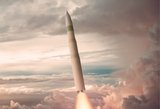Russia says OPCW preparing 'pseudo' report on Syria chemical attacks
Russia on 22 June predicted the global chemical weapons watchdog would present ‘pseudo evidence’ in a report on an alleged chemical attack on the Syrian city of Douma.
Medics and rescuers say 40 people died in a chlorine and sarin attack on Douma in 7 April that the West attributed to Syrian forces. This triggered missile strikes against alleged chemical weapons sites in Syria by the US, Britain and France.
At a briefing outside Moscow, Igor Kirillov, Head of the Russian Defence Ministry's radiological, biological and chemical protection unit, said Moscow wanted to pre-empt the Organisation for the Prevention of Chemical Weapons' fact-finding mission's report on the Douma incident, which is expected shortly.
Moscow is ‘practically sure of the release of yet another anti-Syrian report’ by the OPCW, Kirillov said.
Kirillov added: ‘It is obvious that yet another accusatory report is being prepared, presenting pseudo evidence.’
OPCW director Ahmet Uzumcu said in Washington that he expects the report to come out in the week of 25 June or so.
Kirillov also accused the OPCW of presenting ‘far-fetched’ evidence of other Syrian chemical weapons attacks that took place in February and March ahead of its ‘hastily called’ special session set to start on 26 June.
The world's chemical weapons watchdog said on 20 June that deadly sarin and chlorine were used in two separate attacks in the village of Latamneh in northwestern Syria in late March 2017.
Its fact-finding mission ‘also concluded that chlorine was very likely used as a chemical weapon’ at Latamneh's hospital and surrounding area on 25 March 2017.
Five days later, on March 30 2017, Latamneh suffered a third attack in which sarin was also used, the OPCW said.
In May 2018, the OPCW said that chlorine was ‘likely used as a chemical weapon’ in a February attack on the Syrian town of Saraqeb.
Kirillov described the OPCW findings on Latamneh and Saraqeb as ‘dubious incidents that have not been mentioned before.’
The OPCW director Ahmet Uzumcu told AFP of the 30 March 2017 attack using sarin on Latemneh in an interview in October 2017.
Russia on 22 June also presented what it said was equipment discovered in a ‘chemical laboratory’ used by rebels in Douma, the main town in the onetime opposition bastion of Eastern Ghouta near the Syrian capital Damascus.
Some of this equipment came from Western Europe, said Russian Foreign Ministry Spokeswoman Maria Zakharova.
Zakharova said: ‘What you see – this equipment – was used by fighters, terrorists, it was discovered in Douma.’
She added that some of the equipment was manufactured ‘in Western Europe’ and ‘came into the hands of terrorists and fighters from Western Europe.’
More from Defence Notes
-
![US Air Force pushes Sentinel’s initial capability to early 2030s despite China’s nuclear progress]()
US Air Force pushes Sentinel’s initial capability to early 2030s despite China’s nuclear progress
While the US struggles to modernise the 50-year-old land leg of its nuclear triad, China has been rapidly developing and fielding new nuclear capabilities.
-
![New opportunities for defence firms as EU steps up support for Ukraine]()
New opportunities for defence firms as EU steps up support for Ukraine
The European Commission is looking for startups and other innovators to address challenges across the land, air and sea domains.
-
![Why small guns have been critical to layered CUAS architectures]()
Why small guns have been critical to layered CUAS architectures
Multiple countries have been deploying small arms as the last line of drone defence due to their multiple operational and tactical advantages.
-
![Singapore Airshow 2026: ST Engineering hints at export success for AME assault rifle family]()
Singapore Airshow 2026: ST Engineering hints at export success for AME assault rifle family
The Singapore-based technology company unveiled its new rifle family at this week’s airshow. Chen Chuanren spoke with the ST Engineering’s head of small arms to find out more about how the weapons have been refined.
-
![High tension in the High North – a wake-up call for NATO’s future Arctic defence efforts?]()
High tension in the High North – a wake-up call for NATO’s future Arctic defence efforts?
Any potential ‘Arctic Sentry’ mission would be months in the planning, but with tensions high in the region given the US’s push for Greenland, NATO countries will need to continue to emphasise their commitment to the region, analysts have said.























